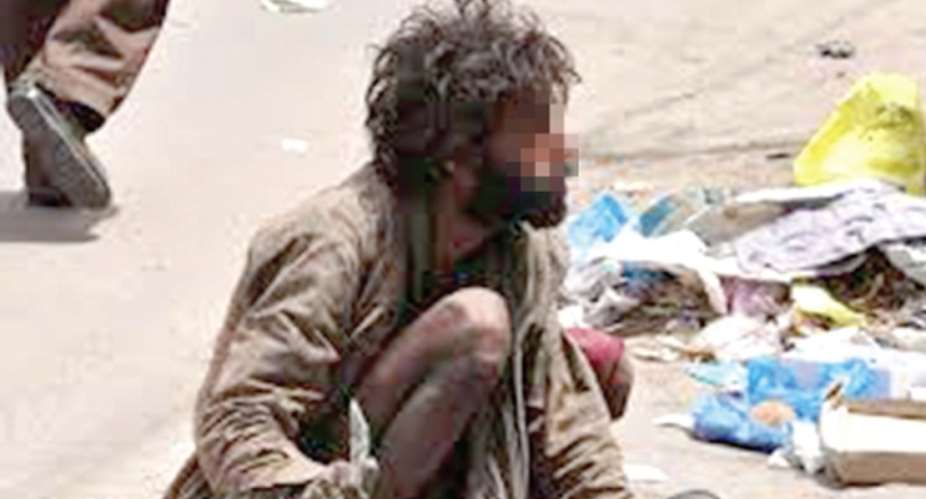The streets of Ghana will soon be rid of mentally challenged persons, the Chief Executive Officer of the Mental Health Authority (MHA), Dr Akwasi Osei, has disclosed.
According to Dr Osei, the exercise is in line with the Mental Health Authority Act, Act 846 of 2012 which emphasizes the need for every mental health patient to be taken off the streets.
This is not the first time such an announcement has been made. In 2014, a similar announcement was made and subsequent implementation in Accra on a pilot basis.
Unfortunately, the exercise which was and is still dubbed 'Operation Clear The Street' came to a halt as the mental health facilities could not contain the number because feeding, drug provision and other basic necessities were unavailable to sustain the exercise.
Dr Osei made the announcement in Ho during the 2016 annual performance review of the Mental Health Authority. The review which is the second since the MHA is under theme: 'Accelerating The Pace of Implementation of Mental Health Act 2012, Act 846'.
Speaking to DAILY GUIDE, he stated that the MHA was in close talks with the Ministries of Health and Finance, as well as other donor partners, on funding strategies to ensure a successful work after the opening ceremony of the 2016 mental health programme.
The revived 'Operation Clear the Street' programme is expected to be carried out by the MHA, in partnership with other institutions across the country, such as the regional mental health coordinators, psychiatric centres, psychiatric doctors and nurses, the police, social welfare and the various metropolitan municipal and district assemblies.
Dr Osei said the operation unlike the one done in 2014 would be done in phases, as it would be impossible to clear all 6,600 (preliminary estimate) mentally challenged persons at a goal. They would create spaces in the various psychiatric facilities, then locate where the patients are before they can carry them to the hospital for treatment based on the available space.
After treatment, they would send them to their respective families, then go in for another batch until they are able to reach out to all of them.
He said while the process is ongoing, the MHA would conduct an exhaustive survey to ensure the actual number of mentally challenged persons in the country is known, as the current figure of 6,600 does not cover many rural areas.
Although parliament passed the Mental Health Bill to ensure that standards, conditions and resources are provided to ensure care and protection of the rights of mentally challenged persons, majority of them still do not have access to basic care.
More so, personnel, drugs and facilities which facilitate the care of such persons in Ghana are woefully in adequate to the extent that mental health workers had to go on strike in 2016 to protect their lives and demand provision of drugs for patients and better conditions of service.
The Director General of the Ghana Health Service (GHS), Dr Ebenezer Appiah-Denkyira, bemoaned the lack of resources and funds for mental health in Ghana and promised that the service was working closely with the Ministry of Health and the Ministry of Finance to improve the situation.
From Fred Duodu, Ho ( [email protected] )





 We’ll no longer tolerate your empty, unwarranted attacks – TUC blasts Prof Adei
We’ll no longer tolerate your empty, unwarranted attacks – TUC blasts Prof Adei
 Bawumia donates GHc200,000 to support Madina fire victims
Bawumia donates GHc200,000 to support Madina fire victims
 IMF to disburse US$360million third tranche to Ghana without creditors MoU
IMF to disburse US$360million third tranche to Ghana without creditors MoU
 Truck owner share insights into train collision incident
Truck owner share insights into train collision incident
 Paramount chief of Bassare Traditional Area passes on
Paramount chief of Bassare Traditional Area passes on
 Two teachers in court over alleged illegal possession of BECE papers
Two teachers in court over alleged illegal possession of BECE papers
 Sunyani: Victim allegedly shot by traditional warriors appeals for justice
Sunyani: Victim allegedly shot by traditional warriors appeals for justice
 Mahama vows to scrap teacher licensure exams, review Free SHS policy
Mahama vows to scrap teacher licensure exams, review Free SHS policy
 Government will replace burnt Madina shops with a new three-story, 120-store fac...
Government will replace burnt Madina shops with a new three-story, 120-store fac...
